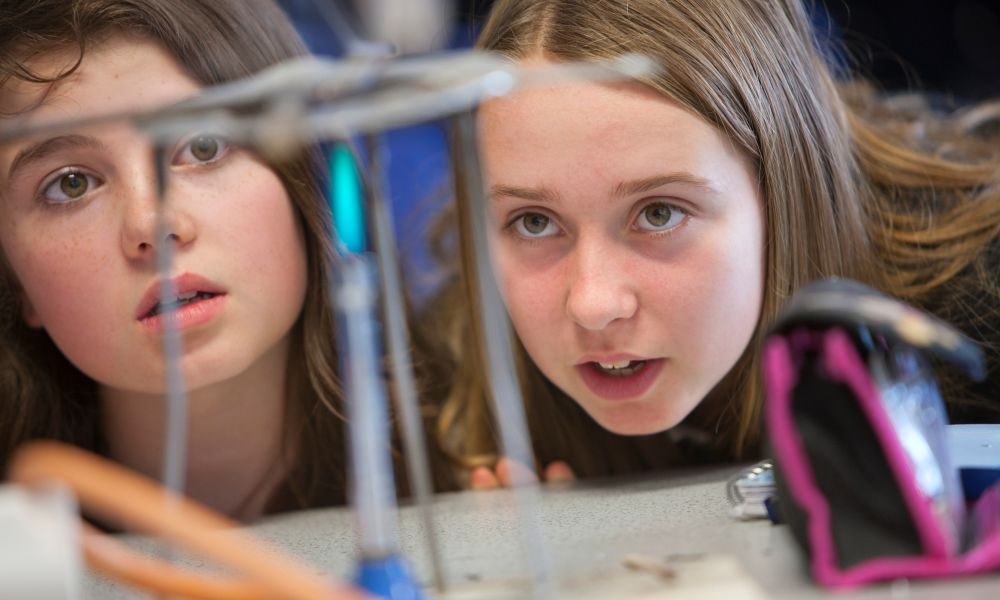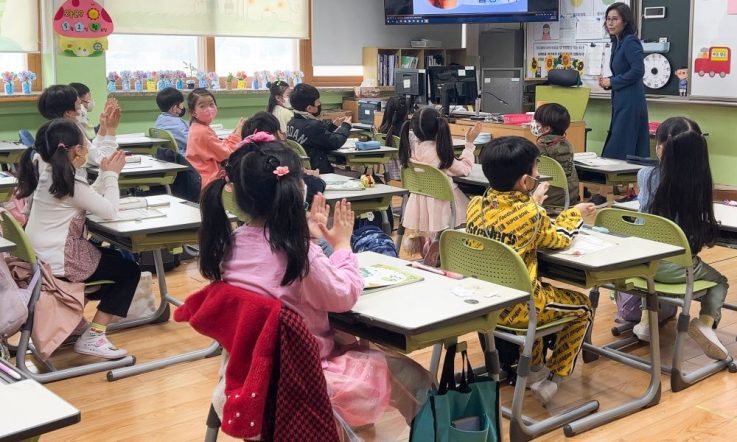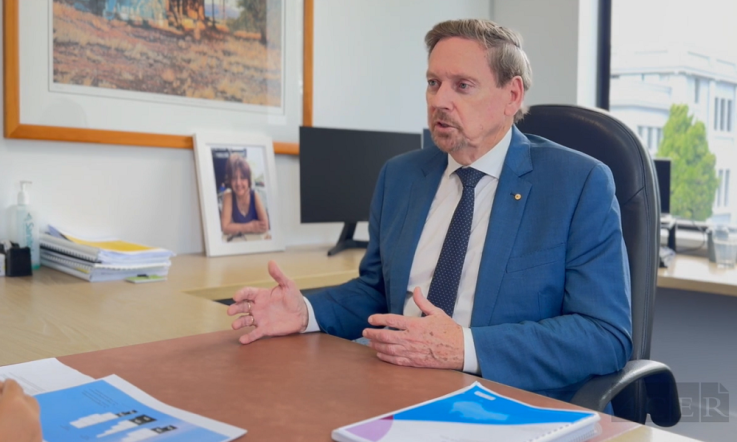This podcast from Teacher is supported by MacKillop Seasons, whose Seasons for Life project supports schools with loss and grief following a suicide and other loss event.
Hello and welcome to this podcast from Teacher, I'm Jo Earp. My guest for this special miniseries is Professor Geoff Masters, CEO of the Australian Council for Educational Research. His new book, Building a World-Class Learning System, Insights from Some Top-Performing School Systems, explores what's happening in British Columbia, Estonia, Finland, Hong Kong and South Korea. That includes what these education systems have in common, the strategies that they employ and the decisions they're making at both a policy and a practice level to support students now and into the future. In part one, we’ll be getting to know more about the study and the 5 systems, and some of the issues they’re grappling with. I hope you enjoy the episode.
Jo Earp: Hi Geoff, thanks for joining us here at Teacher. So, over the next 3 episodes, then we'll be talking about some of the findings from your multi-year study into world class learning systems. Before we look in more detail though, what was the aim of this major piece of work? And I'm also interested to hear how you settled on those 5 school systems.
Geoff Masters: Yes, hi Jo. The study was commissioned by the National Centre on Education and the Economy in Washington DC. So, they asked me to lead an international study to look at these 5 school systems in an attempt to understand what it is they've done that may have led to their particularly high performance internationally in programmes like the OECD PISA surveys. So, they selected the 5 jurisdictions and asked me to look at this these 5 because they had performed at unusually high levels. And they asked me in particular to look at the curriculum, the assessment and examination processes that they have in place, how learning is reported on, how teachers are prepared and developed, how leaders are prepared and developed, any special supports the systems have in place for students who need additional support, and how they work with the broader community environment, the ecosystem within which schools are located.
JE: Plenty of work to look at there, I should imagine; you've got all that to look at and 5 jurisdictions as well, so, as I say, it's a major piece of work. So, you were looking at British Columbia, which of course is a province in Canada, Estonia, Finland, Hong Kong and South Korea. You make the point at the beginning of the book, right at the beginning, that all school systems around the world, they're essentially grappling with the same questions, aren't they?
GM: Yes, yes. There are 2 main questions we could see that these 5 – and I suspect this is true everywhere – these 5 jurisdictions are looking at. And the first question is: How do we better prepare young people for the future (for future learning, for future life, work) how do we do that in a world that's changing rapidly and is quite unpredictable? And then the second question that they are all grappling with is: How can we ensure that every student learns successfully and achieves their potential? And I think what all 5 jurisdictions have concluded is that they're not doing these 2 things as well as they might. These are continuing challenges, the kinds of curricula, the processes that these systems have in place, they believe are not doing the job that they might be doing in providing young people with the best possible preparation for the future. And they also recognise that large numbers of young people, even in these very top performing systems, are left behind in their learning and end up not achieving the kinds of outcomes that they will require if they're to function effectively in life beyond school.
JE: So, if we were to look at different systems in different parts of the world, they'd still be grappling with those questions as well. They're the big challenges – certainly those questions, particularly around preparing children for the future, equipping them with the skills that they need to, to thrive at school and beyond as well. Those are the kinds of things that I imagine listeners will certainly be thinking about too, the teachers and leaders out there. But, at a government and systems level, many countries have different ways of thinking about how to then respond to these types of questions. The 5 jurisdictions that you look at, they're all on what's called ‘trajectories of reform’, I guess that's one way of saying it. What are the common components of that reform?
GM: Well, I think what one can see across all 5 of these school systems is that they understand that to address the challenges that we've just been talking about, the 2 big challenges, we need to look carefully at, and reform (or transform, many of them will now say) the structures within which teachers and schools work. So, what we ended up in this study calling: the learning system; the curriculum; assessment processes; how teachers are prepared, etc. So, that's the first observation – that they all recognise that if you are going to transform teaching and learning in schools to address the challenges that we now face, we need to transform the structures within which schools work. And that's not always recognised around the world. You see many countries that undertake reforms that amount to nothing more than tweaking what they currently have, making minor modifications to existing arrangements, not engaging in deep reform; often looking to teachers to solve the problem, concluding that the problem must be the quality of teachers, the kinds of teaching methods that are being used. But what all 5 of these jurisdictions recognise is that they need to look at the content of the curriculum, they need to think about what it is that we now value and are looking for in young people; what kinds of knowledge, what kinds of skills, what kinds of personal attributes and dispositions will prepare young people for the future?
And they're all saying we need to move beyond the memorisation of content. Content, of course, is very important – facts and routines and so on – in subjects. But we need to move beyond curricula that are focused on content alone and look at deep learning, look at how curricula can be redesigned to promote deep conceptual understanding, understanding of concepts and principles, how curricula can be redesigned to provide opportunities for students to apply what they're learning, to transfer it and use it in a range of different contexts; and how can we develop skills in doing that? Skills like thinking, critical thinking, creative thinking, problem solving. Working in teams to solve problems. And personal attributes – things like resilience and persistence and a growth mindset.
So, that's one thing you can see across these 5 jurisdictions, is that they are all looking at how they can reform their curricula to be more holistic in their approach, to focus on the whole student, not on narrow memorisation and reproduction. And then, in addition to that, they're also looking at how they can make their curriculum more flexible for the purposes of ensuring that every student learns successfully. Because what they're concluding, most of them are concluding, is that very rigid, time-based traditional curricula are actually functioning as sorting mechanisms and sorting a proportion of students out over time as the curriculum moves on and students fall behind. So, they're looking at how they can introduce more flexible arrangements and all of that has implications for how learning itself is conceptualised and assessed and reported. So, they're all focused on these big challenges.
JE: And, yeah, I’s a big challenge as well. We’ll talk more about that, and I also want to move on to goals for student learning and the school curriculum. But, first, we’ll just pause for a moment for a quick message from our sponsor.
You’re listening to a podcast from Teacher magazine, supported by MacKillop Seasons, whose Seasons for Life project supports young people affected by suicide and other loss events throughout Australia. Free for Australian high schools and based on the strong evidence-base of the Seasons for Growth change, loss and grief education programs, the Seasons for Life project builds wellbeing, resilience, social and emotional coping skills, and strengthens supportive relationships.
JE: OK, welcome back to part one of Teacher’s miniseries on world-class learning systems. I'm here with Professor Geoff Masters. As I was reading the book, Geoff, these are really long-term projects aren’t they, and it's sometimes decades for this kind of reform. And as you said, it's not just tweaking, it’s not just dabbling around the edges, slow and steady – it's very urgent, it’s deep transformation, it's about very ambitious reforms, isn't it?
GM: Ambitious reforms and, as I say, around the world now, many school systems are talking about the need to not just reform but to transform what they're doing, to radically change how they're thinking. And the kinds of changes that we've just been talking about – things like moving to recognise and promote a broader range of learning outcomes, adopting a more holistic approach to student learning and development, that's a very big challenge. Almost all curricula around the world are pretty traditional in the way they've been developed, and to broaden the outcomes is a big challenge. Similarly, introducing more flexibility into student learning into the way that learning occurs in schools to benefit all learners, is a long-term agenda. As you say, it's a very big challenge to think about how we do that because we've all become so familiar with a very traditional, well understood model of learning at school.
JE: Okay then, so let's talk about student learning goals, now, it's not just the academic side of things, is it?
GM: No, it's not just the academic. Although, I should say that all 5 of these very high performing school systems do organise their curricula around subjects, or around disciplines. So, it's not as though Mathematics has disappeared, or History has disappeared, or Science has disappeared, they still structure their curricula around those traditional subjects. But, within that context, certainly there's a much higher focus now on what some just call ‘basic skills’; things like literacy and numeracy and ICT literacy, some may throw into the mix entrepreneurial skills. There's certainly a much greater focus on thinking skills, critical thinking, creative thinking; personal skills like a positive personal identity, personal awareness; self-management skills, self-learning skills. So, skills that relate to the individual and that are personal; and social skills like communication skills, social responsibility, cultural competence, collaboration, as I said before, teamwork skills.
So, many curricula are now identifying a broader range of competencies or skills, a broader range of personal attributes, attitudes, values, dispositions, and trying to incorporate those into their curricula. And this also is an interesting question. How does one do that? How does one incorporate that broader range of outcomes into curricula? Sometimes what one sees is that the curriculum continues to be conceptualised as it is – that is, a set of subjects with facts and procedures that need to be learnt – and then there are other outcomes (like the competencies, the general capabilities and attitudes and so on that I've been referring to), they sit alongside the subject curriculum, and they're not always given the same value. And the challenge often is for teachers to work out how to incorporate or to embed those sorts of things in into curricula.
But I think one of the things that we can start to see now is more efforts are being made to say, well, critical thinking is actually an important part of development in Science, for example. It's not something that sits outside Science, it's actually an integral part of developing proficiency in Science, the increasing ability to think critically. Or, creative thinking is an element of Mathematics, or an element of History. So, the point I'm making is that a number of these systems are now asking the question: How do we really integrate these kinds of capabilities, competencies, attributes into the mainstream curriculum rather than treating them as sitting outside, being addressed only through co-curricular activities or within specific areas of the curriculum? These are challenges that all these systems are currently grappling with.
As an example, Estonia has been focused on what we would call in Australia ‘General Capabilities’ for many years, going back to the early 90s when they achieved their independence. And … what the Ministry has done, working with the 2 main universities there in Tallinn and Tartu is develop instruments for assessing things like critical thinking, or creative thinking. So again, these are instruments that are in addition to subject learning, but that's the way Estonia has approached this.
If you look at British Columbia, what British Columbia has done is to develop rubrics, I guess you could call them, or progressions of development. They consist of a set of about 6 levels in things like Critical and Reflective Thinking (is one area) and these frameworks of 6 levels aren't tied to any particular year of school, they're developed primarily at this stage for students to reflect on their own level of critical and reflective thinking: What point have they reached in that aspect of their learning? What can they do? What would come next in their learning? So British Columbia has developed these frameworks, and made them available as tools for self-reflection on the part of students.
JE: And, yeah, and they've been doing a lot of work there on this transformation for a long time. Those student learning goals, what they're expected to know and learn and what they're aiming for, of course that goes hand-in-hand with a quality curriculum then. In the book, you devote a chapter to curriculum, and analysing the data and evidence and observations from these 5 jurisdictions you came up with a number of core characteristics.
GM: Yes, there are a number of things you can see that are common. They're often directions in which these systems are moving is probably the best way to characterise them. So, I've already referred to a couple of these. One is an increasing focus on deeper learning, moving away from relatively superficial memorisation to develop students’ deeper understandings of important ideas. British Columbia refers to big ideas that are core to school subjects and that often develop over extended periods of time. So, you can see that across all these jurisdictions, they are moving away from more superficial memorisation towards developing students’ deeper understandings and their abilities to transfer and apply those understandings to unseen contexts.
They're also giving greater priority, as I've been saying, to skills and competencies and personal attributes that go beyond subject learning or that become integrated into subject learning and become part of subject learning. They're also all encouraging in one way or another, more integrated approaches to learning. So, if you look at what they've done historically, they've often, in their curricula and in their learning arrangements, separated knowledge from skills, theory from practice, academic from vocational learning. And, as I say, in one way or another, they're all trying to find ways of better integrating that learning, recognising that knowledge and skills need to be developed together. That every young person hopefully will end up in a vocation, and so vocational learning is important to everybody. So, in some cases, as in British Columbia, you can see that in their upper secondary school arrangements they have largely done away with separate vocational and academic streams, and they've tried to integrate those more.
You can also see across the 5 jurisdictions, an interest in allowing teachers and local education authorities more autonomy in adapting or designing curricula within frameworks. So, the intention here is to not have everything centrally specified, but to allow adaptation of curricula, as I say, often within broader frameworks, with the intention of better meeting local needs, the needs of students locally, and also providing greater flexibility in the curriculum to meet individual needs. So, I referred earlier to, you know, the kind of rigid structure of the curriculum, the heavily time-based nature of curricula, finding ways to introduce more flexibility into the system so that individual needs are better identified and addressed.
JE: Ah, and the question is, how do we do that? But we’ll save that for another episode. And again, as you were speaking there, I'm sure there's lots of listeners who are nodding their heads at particularly the point about meeting individual need, but also deep learning and mastery. So, it's been really good to get more of an overview of the systems and the kind of things that they've been thinking about and that's set us up nicely for the rest of the series, then. In Episode 2, we'll be talking about creating the conditions for all students to learn successfully, and then in the final one, in Episode 3 we'll take a closer look at meeting individual student needs. In the meantime, if you want to download a copy of the book, I'll pop a link into the transcript of this audio, which is over at teachermagazine.com. For now, though, Professor Geoff Masters, thanks for sharing your expertise with Teacher.
GM: It's a pleasure.
That’s all for this episode, if you want to keep listening now, you can access 300 episodes in the Teacher archives over at teachermagazine.com or wherever you get your podcasts from. Before you go, please take a moment to leave a review on our podcast channel – it helps people like you to find the podcast and it’s a big support for team.
You’ve been listening to a podcast from Teacher, supported by MacKillop Seasons, Seasons for Life, supporting schools and young people affected by suicide and other significant losses. Visit mackillopseasons.org.au.



